Philippine Studies is a broad field dedicated to understanding the history, culture, society, and traditions of the Philippines. By combining historical research with ethnographic viewpoints, scholars gain a deeper and more holistic perspective on Filipino identity and the forces that shaped it over time.
This topic explores how historical approaches and ethnographic methods contribute to Philippine Studies, highlighting their importance in understanding Filipino culture, history, and contemporary society.
What is Philippine Studies?
Philippine Studies is the academic study of everything related to the Philippines—its people, history, languages, customs, beliefs, political systems, and social structures. It is an interdisciplinary field, meaning it draws from history, anthropology, sociology, political science, literature, and more.
Scholars in Philippine Studies aim to understand the uniqueness of Filipino culture while also examining the global influences that have shaped the nation.
Historical Viewpoints in Philippine Studies
Understanding the Past to Explain the Present
Historical viewpoints in Philippine Studies focus on documented events, primary sources, and archival records to reconstruct the past. Through historical analysis, researchers trace how colonialism, migration, trade, wars, and revolutions influenced the development of the Philippines.
Key Historical Periods in Philippine Studies
- Pre-colonial Era: Indigenous governance, trade networks, and early cultural practices.
- Spanish Colonization: More than 300 years of Spanish rule left a lasting impact on religion, education, and governance.
- American Period: Introduction of public education, modern infrastructure, and democratic ideals.
- Japanese Occupation: A period marked by war, resistance, and suffering during World War II.
- Post-independence Era: The struggle for national identity, economic development, and political stability.
Each of these periods provides valuable historical insights into Philippine society today.
Ethnographic Viewpoints in Philippine Studies
Studying Culture Through the Lived Experiences of People
Ethnographic viewpoints focus on everyday life, traditions, rituals, and social relationships within Filipino communities. This method relies heavily on fieldwork, participant observation, and in-depth interviews, allowing researchers to document cultural practices from the perspective of the people themselves.
Importance of Ethnography in Understanding Filipino Culture
Ethnographic research helps capture the diversity of cultures across the Philippines. With over 100 ethnolinguistic groups, the country’s cultural landscape is incredibly rich and complex. Ethnographers explore:
- Language and Oral Traditions: How stories, songs, and oral history preserve indigenous knowledge.
- Rituals and Beliefs: How religious ceremonies, festivals, and healing rituals reflect cultural values.
- Social Organization: How kinship, bayanihan (community spirit), and social hierarchies shape community life.
- Material Culture: The study of artifacts, textiles, architecture, and tools to understand cultural heritage.
Combining Historical and Ethnographic Approaches
Bridging Time and Culture
When combined, historical and ethnographic approaches create a more complete picture of Philippine society. While history provides a timeline of events, ethnography reveals the meanings people attach to these events in their daily lives.
For example, studying the fiesta tradition through historical records explains its Spanish colonial origins, while ethnographic fieldwork uncovers how modern Filipinos celebrate fiestas today, blending Catholic rituals with indigenous customs and contemporary practices.
Case Study: The Ifugao Rice Terraces
Historical Significance
The Ifugao Rice Terraces are often called the Eighth Wonder of the World, dating back over 2,000 years. Historical research helps trace the engineering techniques, irrigation systems, and trade networks that sustained these terraces for centuries.
Ethnographic Perspective
From an ethnographic viewpoint, the terraces are not just agricultural sites but are deeply tied to Ifugao identity. Rituals such as punnuk (harvest rituals) and mumbaki (traditional healers) show how rice cultivation connects to spiritual beliefs, social organization, and community cooperation.
The Role of Colonialism in Philippine Studies
Historical Documentation
Colonial records from Spanish missionaries, American administrators, and Japanese occupiers provide important data for historians studying the Philippines’ colonial experience. These documents reveal how colonial powers tried to shape Filipino culture, economy, and politics.
Ethnographic Resistance
However, ethnographers highlight how Filipino communities resisted, adapted, and creatively blended foreign influences with their own traditions. This process of cultural hybridity—combining indigenous beliefs with colonial religion, for example—can only be fully understood through ethnographic immersion.
Philippine Studies and Indigenous Knowledge
Historical Erasure and Revival
Many indigenous practices were marginalized during colonial rule and modernization. Historical research often uncovers these lost traditions by studying early writings, travel diaries, and archaeological evidence.
Ethnographic Preservation
Today, ethnographers work closely with indigenous communities to document and preserve traditional knowledge systems, such as:
- Herbal medicine.
- Weaving techniques.
- Epics and chants.
- Ecological knowledge.
This partnership helps revive cultural pride and ensures cultural survival for future generations.
Why Philippine Studies Matters Today
Understanding National Identity
By exploring both historical and ethnographic viewpoints, Filipinos gain a deeper sense of who they are. This helps build national pride while fostering respect for cultural diversity across the archipelago.
Informing Policy and Development
Insights from Philippine Studies also guide policy-making, particularly in areas like education, cultural preservation, indigenous rights, and tourism development.
Correcting Misrepresentations
For centuries, the Philippines was often portrayed through colonial eyes. Modern Philippine Studies aims to reclaim the narrative, centering Filipino voices and local knowledge.
Future Directions for Philippine Studies
- Digital Archives: Expanding online access to historical documents.
- Community-Based Research: Empowering local communities to lead ethnographic projects.
- Interdisciplinary Approaches: Combining history, anthropology, ecology, and digital humanities to study modern issues like climate change, migration, and urbanization.
Philippine Studies, enriched by historical research and ethnographic fieldwork, is essential for understanding the Filipino past, present, and future. By examining how historical events shaped the nation and how communities continue to express their identities, we gain a deeper appreciation of what it means to be Filipino.
Relevant Keywords:
Philippine Studies, history of the Philippines, ethnography in the Philippines, Filipino culture and tradition, historical viewpoints in Philippine Studies, ethnographic research in the Philippines, indigenous knowledge Philippines, Philippine history and anthropology, colonialism in the Philippines, cultural preservation Philippines, Filipino identity, importance of Philippine Studies, historical research methods Philippines, ethnographic fieldwork Philippines, combining history and ethnography, Philippine cultural heritage, Philippine social studies, historical ethnography Philippines.
